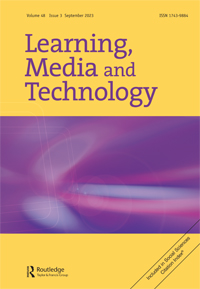国际阅读:如果引用是一种政治实践,我们在阅读谁,我们在引用谁?
IF 4
1区 教育学
Q1 EDUCATION & EDUCATIONAL RESEARCH
引用次数: 2
摘要
从传播科学、政治学到天文学等多个学科,研究都指出了性别引文偏见、种族引文偏见和许多国际期刊向少数国家(包括美国、英国和澳大利亚)作者的地区倾斜(例如,capar、Tacchella和Birrer 2017;迪翁,萨姆纳和米切尔2018;Trepte and Loths 2020)。这些引用模式不仅会影响研究出版物的质量和作为知识贡献的观点和见解的广度,而且还会影响在引文分数对职业生涯至关重要的系统中工作的单个学者的未来。引用是政治性的。我们在《学习、媒体和技术》杂志的文章中发现了这些偏见,并鼓励投稿者考虑他们的手稿是否反映了该领域研究视角的多样性,或者他们的研究和写作是否会从纳入更广泛的研究中受益。问题阅读?多亏了大数据和数据挖掘,所有这些信息都可以在充分尊重个人权利的情况下获得。拥有这些信息的群体能否在技术创新竞争中获得认知优势?(Parra et al. 2018, 86;transl。DeepL)本文章由计算机程序翻译,如有差异,请以英文原文为准。
Reading internationally: if citing is a political practice, who are we reading and who are we citing?
Across multiple disciplines from communication science and political science to astronomy, research has pointed to gender citation bias, racialised citation bias and the regional tilt of many international journals towards authors based in a small set of countries, including the USA, the UK and Australia (e.g., Caplar, Tacchella, and Birrer 2017; Dion, Sumner, and Mitchell 2018; Trepte and Loths 2020). These citation patterns not only have an e ff ect on the quality of research publications and the breadth of perspectives and insights circulating as contributions to knowledge but also on the futures of individual scholars working in systems in which citation scores matter for careers. Citing is political. We recognize these biases in articles in Learning, Media and Technology , and encourage contributors to consider whether their manuscripts re fl ect the diversity of research perspectives in the fi eld or if their research and writing would bene fi t from incorporating a broader range of research. issue reading? Thanks to big data and data mining all this information can be obtained with full respect for individual rights. Could a group, in possession of this information, gain cognitive advan-tages in a scenario of competition for technological innovation? (Parra et al. 2018, 86; transl. DeepL)
求助全文
通过发布文献求助,成功后即可免费获取论文全文。
去求助
来源期刊

Learning Media and Technology
EDUCATION & EDUCATIONAL RESEARCH-
CiteScore
11.40
自引率
14.50%
发文量
53
期刊介绍:
Learning, Media and Technology aims to stimulate debate on digital media, digital technology and digital cultures in education. The journal seeks to include submissions that take a critical approach towards all aspects of education and learning, digital media and digital technology - primarily from the perspective of the social sciences, humanities and arts. The journal has a long heritage in the areas of media education, media and cultural studies, film and television, communications studies, design studies and general education studies. As such, Learning, Media and Technology is not a generic ‘Ed Tech’ journal. We are not looking to publish context-free studies of individual technologies in individual institutional settings, ‘how-to’ guides for the practical use of technologies in the classroom, or speculation on the future potential of technology in education. Instead we invite submissions which build on contemporary debates such as: -The ways in which digital media interact with learning environments, educational institutions and educational cultures -The changing nature of knowledge, learning and pedagogy in the digital age -Digital media production, consumption and creativity in educational contexts -How digital media are shaping (and being shaped by) educational practices in local, national and global contexts -The social, cultural, economic and political nature of educational media and technology -The ways in which digital media in education interact with issues of democracy and equity, social justice and public good. Learning, Media and Technology analyses such questions from a global, interdisciplinary perspective in contributions of the very highest quality from scholars and practitioners in the social sciences, communication and media studies, cultural studies, philosophy, history as well as in the information and computer sciences.
 求助内容:
求助内容: 应助结果提醒方式:
应助结果提醒方式:


